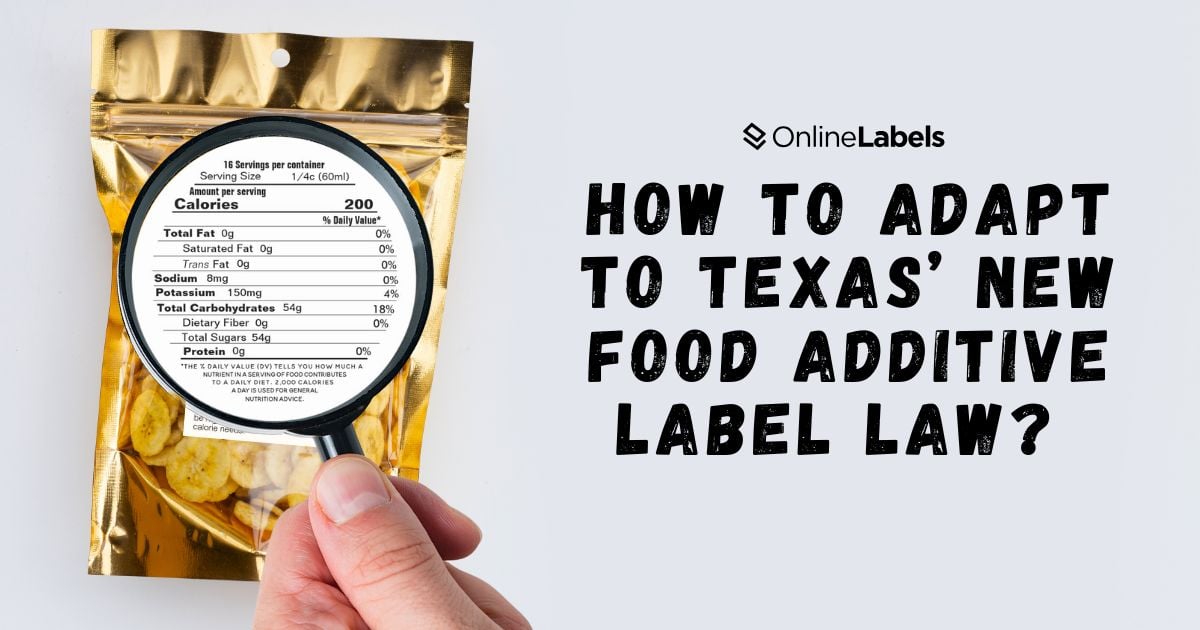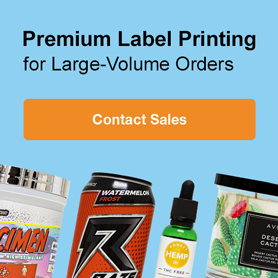How to Adapt to Texas’ New Food Additive Label Law

On May 26, 2025, Texas passed a law requiring food companies to include warning labels on products containing certain ingredients, such as synthetic food dyes, additives, and more. The new law proposal would change food label compliance in Texas as we know it, presenting challenges and opportunities for manufacturers and brands, particularly regarding packaging compliance. As businesses navigate these changes, it's essential to understand how the law will be implemented in Texas, what it means for food production, and how companies can successfully adapt to the new requirements. In this article, we'll break down what the law entails, a few label solutions, what materials to use, and what resources will help you stay ahead.
What Does the New Texas' Food-Additive Warning Law Require?
These regulations are part of a broader effort to increase transparency and consumer awareness around food additives. While the change may raise manufacturers' concerns, the law offers a transition period. Official enforcement won't start until January 2027. This gives food producers time to develop a clear labeling strategy, evaluate their ingredient lists, and consider reformulating products to avoid triggering label warnings.
Food companies should understand the specific labeling obligations outlined in the law to prepare for compliance. Here are the requirements that will be mandatory:
- Apply regulatory labels to packaged goods: this new law will apply solely to snacks, drinks, baked goods, and other packaged foods and beverages sold in Texas.
- Triggering additives: a product must include these labels if it contains 44-50 specific dyes, additives, or chemicals, like:
- Red3 & Red 40, Yellow 5 & Yellow 6, Blue1 & Blue 2.
- Bleached flour, bromated flour, and titanium dioxide.
- Federal preemption clause: the product doesn't need a compliant label if the FDA or USDA categorizes these additives as safe or mandates their own labeling rules, and the law can be surpassed.
- Enforcement and penalties: enforcement will be handled by the Texas' Attorney General, with potential fines reaching up to $50,000 per violation, plus recovered enforcement costs.
What are Some Implications for Food Brands?
- Reformulation opportunity: many brands could remove certain ingredients to comply with the law. Brands like Kraft Mac & Cheese, Heinz Ketchup, Jell-O, and more have already adjusted their branding to these norms.
- Updates for warning labeling needs: to avoid additional costs, brands may add the mandated warnings, redesign packaging, or even cease sales in Texas.
- Compliance costs and business decisions: the financial cost of complying with the law must be considered, and a decision must be made whether to add warning labels or remove certain ingredients to follow the law.
What Resources Can You Use To Stay Updated on the Latest in Label Compliance?
Staying ahead also means knowing where to look for news and who to trust. Here are a few websites where you can stay updated on the norms and responsibilities of the law:
- Food and Drug Administration (FDA) website: this federal agency is the first stop for official guidelines on ingredient disclosures, food labeling requirements, and additive safety.
- State-specific regulatory portals: states like Texas now have mandatory food additive labeling requirements, which are updated online. Visit the Texas Department of State Health Services website to review current regulations, enforcement timelines, and state-specific guidance for manufacturers and retailers.
- Trade associations and industry groups: organizations like the Food Industry Association (FMI), the Consumer Brand Association, or the Specialty Food Association often release regulatory updates and webinars, making the legal changes easier to understand.
How Online Labels Group Can Help You Stay Ahead
Navigating the new state regulations, like Texas' additive warning law, doesn't have to slow your business progress. At OnlineLabels.com, we offer easy label solutions to stay compliant with the new law, without sacrificing speed, quality, and flexibility. For more minor changes and updates in your packaging across your entire product line for the Texas-specific version, we offer the following blank and custom label solutions:
- Faster delivery times: we offer 2-3 business day delivery times, and over 96% of orders are shipped if they are placed before 5:00 p.m. ET.
- Variety of materials: we offer a wide selection of materials to help your business transition to the new law, with weatherproof and removable options for flexibility in labeling and packaging.
- Premium custom label printing: we provide customization options, where you can update your wording, layout finish, and adhesive, giving you complete control over your messaging and design. We also offer an extensive selection of materials, including Estate #9, Biaxially-Oriented Polypropylene (BOPP), Freezer-Grade Paper, Removable White Matte for flexibility in packaging, and more!
For more information on enterprise labeling solutions, our sales team can help your business navigate the latest regulatory label changes.
Helping Food Brands Stay Ahead of Texas' New Food Additive Label
As food labeling laws continue to evolve, especially with the new Texas law, brands must stay informed and ready to adapt. Whether reformulating products or redesigning packaging, early preparation is key to avoiding costly disruptions. At OnlineLabels, we support your transition with blank and custom labels, faster shipping times, and resources to help adapt.


